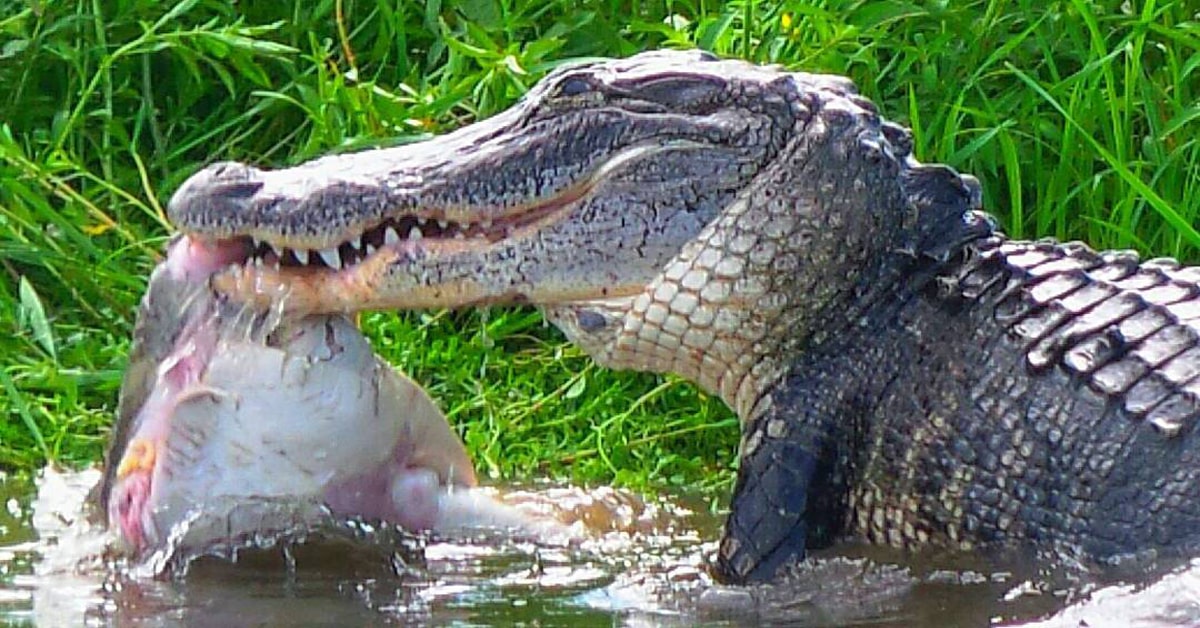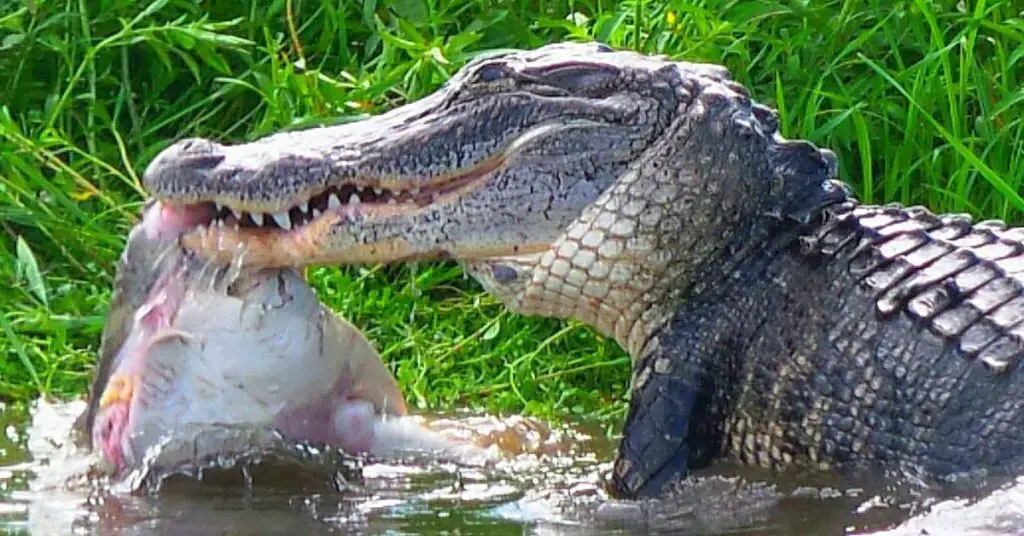Alligators are fascinating creatures that have been around for millions of years. Their powerful jaws and sharp teeth have made them one of the top predators in their environment. But have you ever wondered how they actually eat their prey? In this article, we will explore the unique feeding habits of alligators and how they use their impressive anatomy to devour their meals.
Alligators have a reputation for being ferocious hunters, but their eating habits are actually quite interesting. They are opportunistic feeders, meaning they will eat just about anything that comes their way. From fish to birds to mammals, alligators have a varied diet that allows them to survive in different environments. But how do they actually consume their food? Let’s find out.
Alligators are carnivorous reptiles that eat a variety of prey, including fish, turtles, birds, and mammals. Their diet also includes smaller alligators. Alligators have incredibly strong jaws that allow them to crush the shells of their prey. They swallow their food whole, and their stomach acid is strong enough to digest bones and hooves. Alligators are opportunistic feeders and will eat whatever prey is available. They can go for long periods without eating and can consume up to 10% of their body weight in one meal.

How Do Alligators Eat?
Alligators are fascinating creatures that are known for their powerful jaws and ability to take down prey much larger than themselves. But have you ever wondered how these reptiles actually eat? In this article, we will explore the eating habits of alligators and how they are able to survive and thrive in their natural habitat.
The Anatomy of an Alligator’s Jaw
Alligators have one of the strongest bites in the animal kingdom, thanks to their powerful jaws and sharp teeth. Their jaws are designed to clamp down on prey with tremendous force, making it virtually impossible for their prey to escape. In fact, an alligator’s bite can generate up to 3,000 pounds of pressure per square inch!
But an alligator’s jaw is more than just a weapon. It also serves as a tool for tearing apart food and crushing bones and other hard materials. The muscles that control an alligator’s jaw are incredibly strong, allowing them to exert immense force when needed.
Benefits of an Alligator’s Strong Jaw
An alligator’s powerful jaw and bite force are essential for their survival. These features allow them to catch and kill prey quickly and efficiently, reducing the risk of injury or escape. Additionally, their strong jaw muscles make it easier for them to consume tough, fibrous materials like bones and cartilage.
The Alligator’s Diet
Alligators are carnivores, which means they primarily eat meat. Their diet consists of a variety of prey, including fish, turtles, birds, and mammals. Alligators are also known to scavenge, feeding on carrion or the remains of dead animals.
When hunting, alligators use stealth and patience to catch their prey. They often lie in wait just below the surface of the water, waiting for an unsuspecting animal to come close enough to strike. Once they have caught their prey, they will use their powerful jaws to kill it quickly and efficiently.
Benefits of an Alligator’s Varied Diet
Alligators have a varied diet, which allows them to adapt to changes in their environment. If one source of food becomes scarce, they can easily switch to another. This versatility helps ensure their survival in the wild.
The Alligator’s Digestive System
Once an alligator has caught and killed its prey, it must be eaten. Alligators are known for their ability to swallow large chunks of food whole, thanks to their flexible esophagus and stomach. They are also able to store food in their stomach for long periods of time, allowing them to digest it slowly and efficiently.
Once the food reaches the alligator’s stomach, it is mixed with powerful digestive enzymes that break down the proteins and other nutrients. The food then moves on to the small intestine, where it is further broken down and absorbed into the bloodstream.
Benefits of an Alligator’s Efficient Digestive System
Alligators have an incredibly efficient digestive system, which allows them to extract as much nutrition as possible from their food. This is essential for their survival in the wild, where food can be scarce at times.
Alligators vs. Crocodiles
Alligators and crocodiles are often confused with one another, but they are actually two different species with distinct differences. One of the biggest differences between the two is their diet. While alligators primarily eat meat, crocodiles are known to eat both meat and plants.
Additionally, crocodiles have a more streamlined body shape and a longer, narrower snout than alligators. Alligators, on the other hand, have a wider, more rounded snout.
Benefits of Knowing the Differences Between Alligators and Crocodiles
Understanding the differences between alligators and crocodiles can help you identify them in the wild and avoid potential dangers. It can also help you appreciate the unique characteristics of each species.
In Conclusion
Alligators are fascinating creatures with a unique set of eating habits and adaptations that have helped them survive for millions of years. Their powerful jaws and efficient digestive system make them formidable predators, while their varied diet and ability to adapt to changing environments ensure their continued survival in the wild.
Frequently Asked Questions
Here are some common questions people ask about how alligators eat:
What do alligators eat?
Alligators are carnivores, which means they only eat meat. Their diet consists of fish, birds, turtles, snakes, and mammals such as deer and wild pigs. Alligators are opportunistic feeders, which means they will eat whatever prey is available to them.
Alligators are ambush predators, which means they wait for their prey to come close before attacking. They have a powerful bite and are able to crush the bones of their prey with their strong jaws.
How do alligators catch their prey?
Alligators wait in the water for their prey to come close. When the prey is close enough, the alligator lunges forward and grabs it with its jaws. Alligators have sensors on their jaws that can detect vibrations in the water, which helps them locate prey.
After catching their prey, alligators will often take it to a safe spot to eat. They will use their powerful jaws to tear apart the prey and then swallow it whole.
Do alligators chew their food?
No, alligators do not chew their food. They have a simple digestive system that is not designed for chewing. Instead, they use their powerful jaws to tear apart their prey into smaller pieces that can be easily swallowed.
Once the prey is swallowed, it goes into the alligator’s stomach where it is broken down by stomach acids and digestive enzymes. The alligator’s digestive system is very efficient, allowing it to extract all the nutrients it needs from its food.
How often do alligators eat?
Alligators do not have a set schedule for eating. They will eat whenever they are hungry and there is prey available. During the winter months, when the temperature drops, alligators will eat less frequently because their metabolism slows down.
During the summer months, when the temperature is warm, alligators will eat more frequently because their metabolism is higher. They may eat several times a week or go several weeks without eating, depending on the availability of prey.
Do alligators eat humans?
While alligators have been known to attack humans, they do not typically see humans as prey. Most alligator attacks occur when humans enter the alligator’s habitat, such as swimming in a lake or river where alligators live.
Alligators may also attack if they feel threatened or if they are protecting their young. It is important to remember that alligators are wild animals and should be treated with respect and caution.
What Eats Alligators? 10 Predators That Prey on Alligators
In conclusion, alligators are fascinating creatures and their eating habits are no exception. From their powerful jaws and razor-sharp teeth, to their unique digestive system, alligators have adapted to thrive in their environment.
While they may seem like ruthless predators, alligators play a crucial role in maintaining the balance of their ecosystem. Through their efficient hunting and feeding habits, they help control populations of prey animals and prevent overgrazing and other ecological imbalances.
Overall, learning about how alligators eat is not only interesting, but also important for understanding the intricate web of life in our world. Whether you’re a nature enthusiast or simply curious about these incredible creatures, studying their feeding habits is sure to leave you with a newfound respect for these apex predators.


